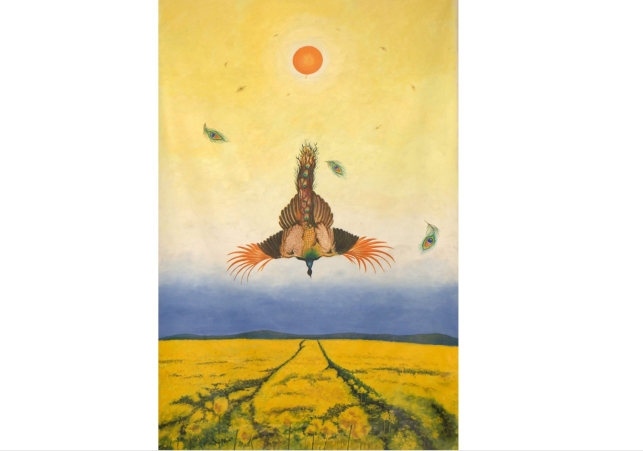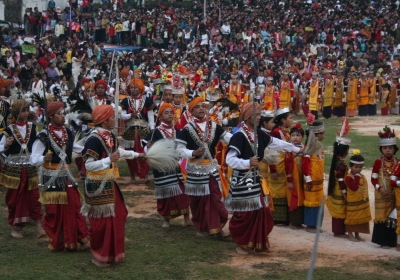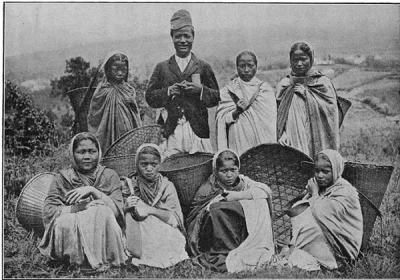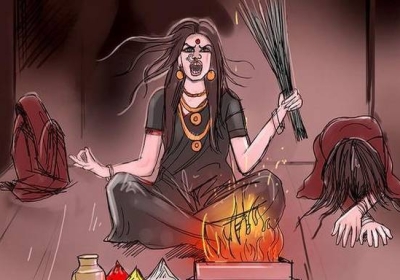Khasi Heritage: Metaphor and Parable

One of the most exhilarating stories is the folktale about the sun and the peacock. After the failed attempt of the hornbill to seduce the sun during the plunge of darkness in the universe, the peacock was flattered and deliberately tricked by the fellow birds for his pleasant appearance that he was designated to visit the sun at her solar realm. Everybody speculated that he would surrender after soaring certain heights, but lo and behold, the peacock reached the threshold to the solar palace and was cordially ushered by the Mother-Sun herself. Subsequently, the peacock became the pampered spouse of the Mother-Sun with conceit and was instrumental in drawing her constant attention, and thereby depriving her service of warmth and sunlight to mother nature. Meanwhile, mankind was suffering due to the lack of sufficient sunlight because the sun was obsessed with her handsome husband and remained indoors, neglecting her duty of providing proper sunlight to the earth. However, the elegant and graceful Mother-Sun was ridiculed and ignored by her beloved husband, Peacock, because vanity overwhelmed his spectacular physical appearance. One fine day, he spotted an attractive element on the surface of the earth and desired to acquire it against the anguish of his dejected wife, Mother-Sun. The alluring witch called ‘Sabuit’ knew that sunlight was denied because the sun was dedicated to the peacock, and hatched a trap to divert his attention from the sun in order to retrieve the sunshine. There was famine on earth due to insufficient sunshine, and everybody was helpless, until the witch was offered to solve the situation because nobody else had the resources or knowledge to salvage. She saves a tiny sack of mustard seeds, and plants them in her field with an appealing shape. Sabuit urged the other creatures to comply with her instruction to provide sufficient support to her endeavour. Ultimately, the vast field of bright yellow mustard flowers becomes the attractive element for the conceited peacock. At that point in time, the Mother-Sun was trying to protect Peacock from infatuation, but he was determined to leave her peaceful celestial abode. As he soared down to the surface of the earth, she wept profusely and tears of sun-flares fell on his waving tail until he reached the flower bed. Straightaway, the peacock realised that he was betrayed by the superficial appearance of the mustard flowers and regretted his intolerance of the sun. Immediately, he asserted with all his strength and tried to fly back to the zenith of the sky, but failed miserably and was compelled to remain on earth eternally. The parable was always relevant to society that vanity engenders compunction. The universal reality in the world of nature are that the bright spots of ocellus in the feathered tail of the peacock are the tears of the sun, the peacocks are always attracted and agitated towards sunrise, and are often found in the midst of the blossoming flowers in the mustard field.
The canopy of dense foliage displays an occasional jut of bayberry fruit. The savoury sour of the fruit was attracted to the pregnant woman who strolled around the wilderness, while fetching fuel logs and twigs. She was not scared to venture on her own accord and wondered how to pluck a bunch of bayberries. As she swallows her saliva with unquenched arousal to relish the mouthwatering juice, she heard someone trailing behind her. She was assured to get the fruits provided she promised something to an unidentified individual. The pregnant woman never realised that it was the tiger who hounded her, because of his wishes for a reward of the conceived child. The tiger proclaimed that she could keep if she gave birth to a boy child, and instead wanted to claim over a girl child, if she agreed. Her extreme desire for bayberries forced her to make a false promise, and the tiger shook the fruit tree as she gathered to her heart’s content. When the natal period was due, the tiger roams around her house and stays underneath the house for his prospect. The wishes of the tiger occurred and a girl child was born, but she denied parting with her, particularly with a beast. The tiger would not dare to fathom into the periphery of human settlement and patiently waited for vigilance in the outskirt of the jungle. The young girl, ‘Ka Nam’ came of age and went to fetch water from the spring along with other damsels, while the tiger was alerted and waiting for an opportune moment.
One fine morning, the tiger succeeded in his attempt at snatching away the young girl without harming the other damsels and took her to his cave inside the jungle. The family members deplored and tried to retrieve the young girl, but all efforts were futile. The tiger did not harm the young girl and fed her with sumptuous meals every day, but kept her on guard from any intrusion. The girl, Ka Nam cooked her own meals and one day she noticed a mice squandering around the fireplace enjoying the leftover rice scattered around. The girl chased away the mice and instead warned Nam of an impending danger. Initially, Ka Nam ignored the tiny creature, but after the mice insisted on her safety solutions, she listened carefully. The mice told Ka Nam that she had grown up and plump enough to be devoured by the tiger, which Ka Nam was scared of knowing that her guardian, the tiger, had gone to fetch other beast friends to feed on her. The mice advised the girl to seek refuge with the toad and the toad lent her outer skin to mask the identity of the girl. The toad is apprehensive of the rigorously ferocious tiger and instructs Ka Nam to flee away to heaven by climbing simultaneously between two trees, one fir tree known as Ka Jri and the other, a type of sandbox tree called Ka Kya. Immediately, Ka Nam ascended consecutively on the two trees with alternate motivational chants as each one grew taller than the other in response to her words till they reached the threshold to the celestial realm. Ka Nam is wandering in the galaxy seeking refuge in every heavenly constellation, but was denied because of the ugly appearance of her mask. The moon, the stars and other celestial bodies did not entertain Ka Nam and chased her away. Ultimately, she sought permission from the sun to stay at her cattle shed in the courtyard and the sun agreed without bothering about her identity. Ka Nam was obliged and committed to be in the service of the sun as she desired.
Ha shlem ba hun ki blei, ba ka sngur te ka mynsiem;
Ha khlaw ranab Diengiei, la synshar te u Simsyiem .
La ka Pariah parai, ha ryngkat danda biria;
Ki sim ki doh byllai, la thapniang ki pyiar saïa.
U shadkyrtoh leh meng, la u tdong ba iar kynnied;
Ka shakyllia pynroh, kha bha sngi u rangdajied.
Ka simkyllaidohdit, ia sylla bad u simsohphoh;
Ki syiem patsha ibit, tyngkong ka sngi te ban khajoh.
Kynting te sha sahit, sha thwei bneng la her lyngba;
Baroh ki sim kyndit, buit shukor u khlem pyrwa.
Jah rngai ha thadlongbneng, u poi tiap tyngkong ka sngi;
U shadkyrtoh ang dheng, pdiang burom hima meingi.
Ka sngi ka la kyndeh, ha la iing te ba ka paiñ;
U shadkyrtoh leh kjeh, ba thut shen ha ka phoi lian.
Ka sngi myllen ha iing, ba ka lngaid bad u sharyntoh;
Mariang ka ba suh sieng, khlem shai khlem shit ba la dum lyoh.
Sympat ka langthari, slap u phria ba ki lynsher;
Hiran satlak ki bri, lanot sepsngi ba la kynther.
Dorbar laiphew jynthaw, sah umdum ba khlem lap ksai;
Khatduh la shem ka daw, ki shijur ba ki dang brai.
U syiar u mih ha phrang, la minot kamram kynih;
U kbeit u swar mariang, ba sabuit hakhmat ka mih.
Symbai tyrso tyngkai, ha pyntha la khreh ban thung;
La swait phira sharai, ka pukni bad liengjathang.
Tang shi aïom la speh, tiew tyrso bastem kur kmur;
U sharyntoh la khreh, khlem pyrkhat ba u leh shlur.
Ka sngi ka la pangnud, khlem suitñiew u la jyndat;
Lynter ka iam ka ud, ha u tdong la jaw ummat.
Lyndet ba leh khyllew, hangamei u shadkyrtoh;
La sin la rngop u klew, khlem kyrtiang la shlur ban noh.
Ha per tyrso la ngat, la babe ym don pyrthei;
Ban khia sohkhliang ummat, ym lah kynting shuh da lei lei.
Dang step phyrngab mih sngi, la kumba jngoh te ia u klew;
Kynjih kyrthlep bapli, klew kyreit na sla khyndew.







